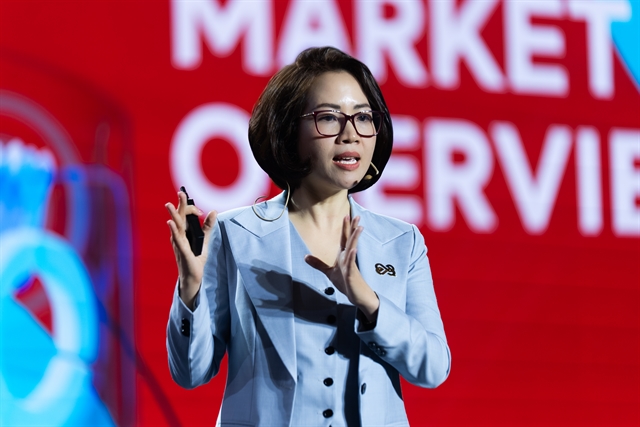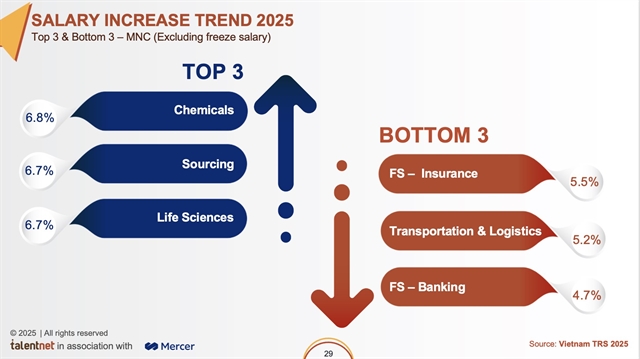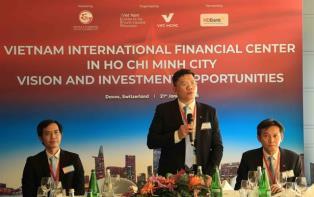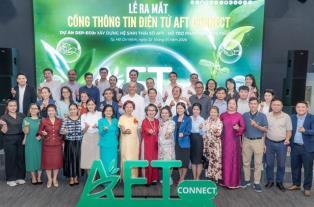Salary growth has slowed to its lowest pace in recent years, reflecting cautious spending and tighter global HR budgets, according to the 2025 Talentnet–Mercer Total Remuneration Survey.

HCM CITY — Salary growth has slowed to its lowest pace in recent years, reflecting cautious spending and tighter global HR budgets, according to the 2025 Talentnet–Mercer Total Remuneration Survey.
The survey, which polled 606 multinationals and 72 local firms, also marked the fifth straight year of growing participation, showing that more organisations are prioritising investment in people strategies.
Nguyễn Thị Quỳnh Phương, head of human capital solutions at Talentnet, said between 2023 and 2025 multinationals recorded record-low salary increases, even lower than during the COVID-19 period.
However, the number of companies implementing salary freezes has dropped notably, from nine in 2024 to four in 2025, and is projected to fall further to three in 2026. This signals efforts to maintain minimum wage adjustments and retain key talent, she said.
Salary growth has also slowed among local firms.
Excluding salary-freeze cases, pay rises at local companies are nearly on par with those of MNCs, but otherwise fell to 5.5–6.2 per cent between 2024 and 2026.
Leading the salary hike race are chemicals (6.8 per cent), sourcing (6.7 per cent), and life sciences (6.7 per cent), industries that thrive on brainpower, precision and innovation.
With the rise of green manufacturing, sustainable supply chains and biotechnology, these sectors are willing to invest more to retain top talent and stay ahead of competitors.
At the lower end are insurance (5.5 per cent), transportation and logistics (5.2 per cent) and financial services – banking (4.7 per cent), which are taking a more conservative approach. As automation and restructuring sweep through, these sectors are saying a polite “maybe later” to hefty raises.
The survey also found that companies are ready to pay more for fresh management talent but remain cautious with other roles. On average, businesses spend 7 per cent more to attract new management hires capable of driving restructuring and operational transformation.
Meanwhile, existing professionals and para-professionals earn 3 per cent and 14 per cent more than new hires.
This gap indicates that firms are relying on experienced, process-savvy teams rather than recruiting aggressively, Phương said.

According to the report, most businesses in 2025 are prioritising stability amid market fluctuations.
Nearly half (47.7 per cent) expect no change in headcount, focusing instead on strengthening internal capabilities.
The share of firms with no recruitment decision yet has risen to 10.6 per cent, nearly double last year’s figure, reflecting a more cautious outlook.
The proportion of companies planning staff reductions has declined slightly, especially in major sectors such as consumer goods, technology and banking.
But fewer firms intend to expand their workforce next year, signalling a strategic shift towards stability over rapid growth.
Voluntary turnover rates among both local and multinational firms remain stable compared with the first half of 2024, suggesting that Việt Nam’s labour market is entering a more balanced phase as employees show greater commitment to their organisations.
Slower economic growth, reduced competition for talent and stronger retention strategies have all contributed to this equilibrium.
Human connection in AI era
The survey results were released during The Makeover 2025 – S-AI-LING AHEAD conference in HCM City recently, where speakers also discussed about “Beyond Pay: What Employees Really Need in the AI Age?”
They agreed that while high salaries could attract talent, meaningful work is what retains them.
Although AI is transforming the world of work, human connection, purpose, and personalisation remain at the heart of employee engagement, they added.
Hạnh Văn, HR chief at Home Credit Vietnam, said AI itself is not the value or content, but only a catalyst that accelerates operations and enhances efficiency.
But the faster technology grows the more companies should return to their core values to create meaning for their people, she said.
She said AI supports employees in three key ways: enables more meaningful work by freeing up time for creative and purposeful tasks, enhances personal development and improves learning and development by fostering critical thinking and creativity in training programmes. — VNS





